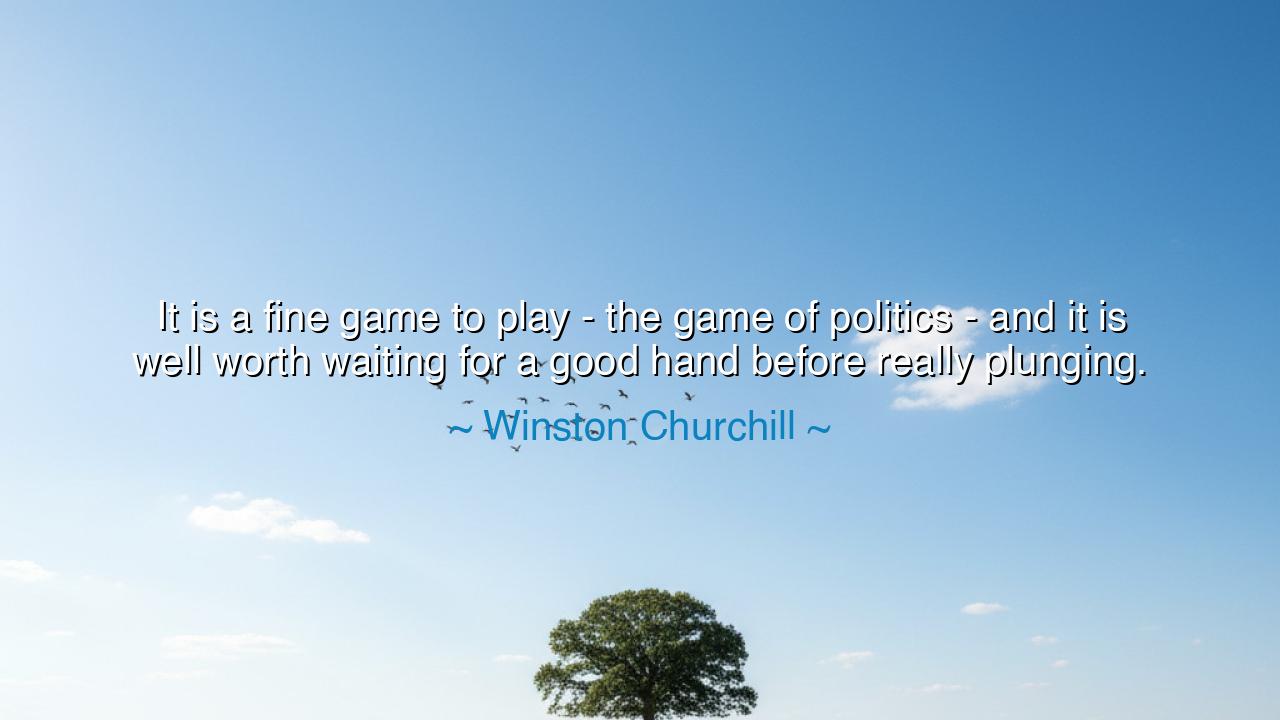
It is a fine game to play - the game of politics - and it is
It is a fine game to play - the game of politics - and it is well worth waiting for a good hand before really plunging.






The words of Winston Churchill — “It is a fine game to play – the game of politics – and it is well worth waiting for a good hand before really plunging” — are at once playful and grave. For he calls politics a game, not to belittle it, but to reveal its nature: a contest of wit, patience, and timing, where fortune favors not the restless hand but the steady one. Like the player at the table who waits for the right cards, the wise statesman knows that haste often leads to ruin, but patience may yield a victory that endures.
Churchill himself lived this teaching. In his early career, he leapt boldly into the stage of power, yet suffered defeats that would have silenced lesser men. He was cast out of office, mocked, and left to wander what he called his “wilderness years.” Yet he did not surrender his seat at the table. He waited, quietly gathering strength, sharpening his words, and watching as the world stumbled toward crisis. When the hour of destiny arrived — when the dark tide of war threatened to engulf all — he held the good hand, and he plunged with unmatched resolve. His patience, his refusal to play recklessly, prepared him for the moment when his voice would rally nations.
The ancients, too, understood this wisdom. Consider Cincinnatus of Rome, who returned to his plow rather than clutch at power. He waited, content in obscurity, until the republic truly needed him. Then, summoned from his fields, he led his people with honor and returned again to his simple life. Both Cincinnatus and Churchill show us that the art of politics is not the frantic grasping of power, but the discipline of knowing when to act.
To call it a fine game is not to strip politics of its weight, but to remind us that games have rules, strategies, and seasons. The impatient player throws away his chance; the wise one waits, observing the field, reading the opponents, and moving only when the moment is ripe. Thus the game becomes not mere chance, but mastery of timing and character.
O children of tomorrow, take heed: in all the contests of life — whether in governance, in labor, or in personal striving — do not waste your strength in reckless plunges. Wait until the hand you hold, strengthened by knowledge and courage, is worthy of the task. Then act boldly, with the fullness of your being. For patience joined with courage is the root of triumph, and this is the enduring lesson Churchill bequeathed when he called politics a game worth the waiting.






TLThang Le
Churchill’s view on politics seems like a call for calculated patience, but does that approach always work in modern politics? With the speed at which news and issues evolve today, can politicians afford to take their time waiting for the right moment? Or is the dynamic nature of current political systems demanding more immediate, bold actions? Could waiting too long lead to lost influence or even public disillusionment?
TDxuan tra do
I understand what Churchill is saying, but I wonder if this approach to politics underestimates the human cost of inaction. If political leaders always wait for the perfect ‘hand,’ they might miss the opportunity to address issues that affect real people. How do we reconcile the need for strategic patience with the urgency of solving immediate societal problems? Does this mindset sometimes allow problems to fester too long?
TDBao Ngoc Tran Dang
Churchill’s idea of playing the ‘game’ of politics makes it sound almost like a calculated competition. But is there a risk in reducing something as important as governance to mere strategy? Can politics truly be just about waiting for the right moment, or does it need to be driven by a sense of urgency, moral duty, and accountability? Are politicians always able to afford waiting for the ‘right hand’ given the stakes involved?
INIng Nhii
I see what Churchill means about waiting for the right moment in politics, but I wonder if this approach could lead to indecision or hesitation when action is required. Politics isn't always about waiting for the perfect hand—sometimes the most meaningful change happens when we take risks or act in the face of uncertainty. How do you balance the strategy of waiting for the right opportunity with the need to act decisively when things are urgent?
NNN.T.Thanh Ngan
The idea that politics is a game is interesting, but it makes me question whether that’s a healthy way to approach such a serious field. Is it wise to treat politics like a game where you only play when the odds are in your favor? Shouldn't the focus be on the duty to serve and enact real change rather than waiting for the perfect moment? Can this mindset lead to missed opportunities for progress?